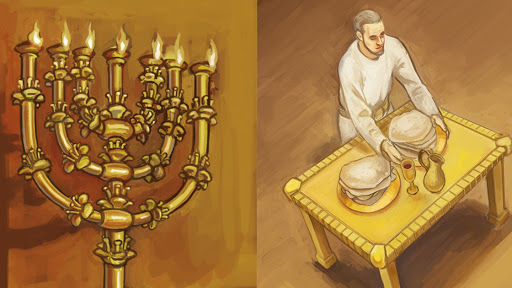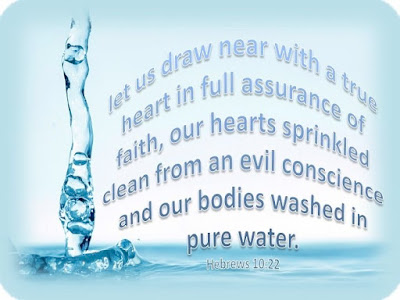Behold, the days are coming, declares the Lᴏʀᴅ, when I will fulfill the promise I made to the house of Israel and the house of Judah. In those days and at that time I will cause a righteous Branch to spring up for David, and he shall execute justice and righteousness in the land. In those days Judah will be saved, and Jerusalem will dwell securely. And this is the name by which it will be called: “The Lᴏʀᴅ is our righteousness.”
For thus says the Lᴏʀᴅ: David shall never lack a man to sit on the throne of the house of Israel, and the Levitical priests shall never lack a man in my presence to offer burnt offerings, to burn grain offerings, and to make sacrifices forever.
The word of the Lᴏʀᴅ came to Jeremiah: Thus says the Lᴏʀᴅ: If you can break my covenant with the day and my covenant with the night, so that day and night will not come at their appointed time, then also my covenant with David my servant may be broken, so that he shall not have a son to reign on his throne, and my covenant with the Levitical priests my ministers. As the host of heaven cannot be numbered and the sands of the sea cannot be measured, so I will multiply the offspring of David my servant, and the Levitical priests who minister to me. (Je 33:14-22)
At the time of the prophet Jeremiah, Babylon was besieging Jerusalem. Both as comfort in the face of fear and uncertainty, as well as promising a future, God reaffirms to His people the offices of king and priest. He had made a covenant with David (2 Sa 7:12-16) guaranteeing that his throne would endure forever as confirmation of Jacob’s prophetic blessing.
The scepter shall not depart from Judah,
nor the ruler's staff from between his feet,
until tribute comes to him;
and to him shall be the obedience of the peoples. (Ge 49:10)
Those promises, made centuries apart, were still effective, though not yet realized. Now, at the brink of national destruction, the people would be questioning whether or not the covenants were still valid. An invading army would soon breach the walls and carry off the people to a strange land. Where was the future? In this scenario, the Lord reaffirms His word. The promises of rule and priesthood are as certain as the covenant of day and night (Ge 8:22), possibly inferring that the offices were more certain than natural order.
The affirmation through Jeremiah of the Davidic rule is remarkable for at least three reasons:
Given to both Israel and Judah – Israel had been taken into Assyrian captivity approximately 125 years prior, yet here the covenant was restated with both halves in full share of what would come. What was cut off will be restored.
Righteous Branch – A righteous one will reign, even one more righteous than “the man after God's own heart.” David was a sinner, though accounted righteous for his faith. The coming King will be greater in every way because of His intrinsic righteousness. No sin will be found in Him.
A name – How many cities and nations do you know that can rightfully accept the name “The Lᴏʀᴅ our righteous”? At that time, the Lord will dwell among His people, and He shall be their God. The Righteous One will be among a righteous people that He pronounced clean and holy by virtue of Christ’s shed blood.
For these promises to come to pass, it seems that God Himself would need to undertake the mission. But that’s the point. The coming messiah, who will establish David’s throne forever, will be God in flesh. He is the only one worthy and able to fulfill the task.
What about the priesthood? Looking at the passage, we have an odd remix of the Mosaic code that deserves some investigation.
No atonement sacrifices – No Sin or Guilt offerings are mentioned, as well as the lack of the Day of Atonement. The reason for these omissions should be self-evident: the time of restoration will be when sin and guilt are removed. Jesus, doing what animal bloodshed could not do, has become the last atoning sacrifice by taking on Himself all sin and paying the price of redemption in full on our behalf. Nothing is left to accomplish.
Lack of high priest – The high priest was required to perform specific duties, especially on the Day of Atonement, but he is missing. Jesus became our high priest after the order of Melchizedek. He continues forever in this role in the beauty of holiness, bearing us before the Father on His heart and shoulders, ever representing man to God and God to man.
Continual sacrifices – Burnt offerings, grain offerings, and miscellaneous sacrifices take place. How is this possible? If Jesus is the final sacrifice, how can any remain? The answer seems to be in accepting these as typological rather than literal. The offerings and sacrifices mentioned were sweet savor and other freewill offerings. Rather than slain animals, they are our worship and obedience as the Lord Jesus rules over us. This will be the overflow of gratitude, similar to that worship pictured in the book of Revelation, for whatever comes from the Father, having humble acceptance and full assurance that it is both good and perfect.
Continuing Levitical priesthood – There is a priesthood that remains. As our Lord Jesus became a high priest after another, better order, so we are a holy, royal priesthood according to that order, replacing what could not be fulfilled by the Levitical priesthood. The new priesthood is unending as we continually are ministering before God, having received Him as our inheritance.
As mentioned, there was a temptation by those in Jerusalem and Judah to lose hope and turn their backs on these certainties—basically giving up on God. Any who did were rejected by the Lord. These are precious promises. Similarly, the writer of Hebrews also warns to not turn back from promises made certain by the Lord of glory and expressed in clear testimony. God is faithful. Let us run with endurance.
Therefore, since we are surrounded by so great a cloud of witnesses, let us also lay aside every weight, and sin which clings so closely, and let us run with endurance the race that is set before us, looking to Jesus, the founder and perfecter of our faith, who for the joy that was set before him endured the cross, despising the shame, and is seated at the right hand of the throne of God. (He 12:1-2)


